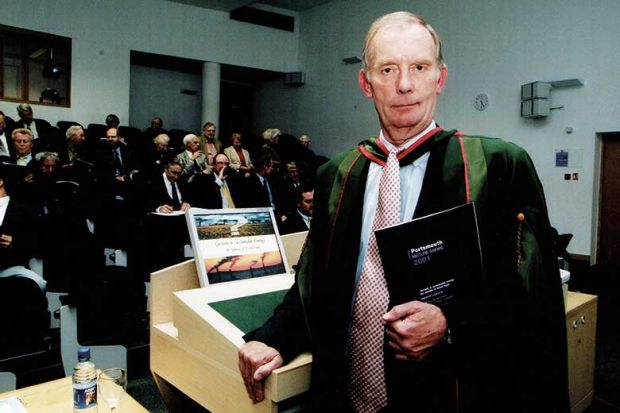An energy engineer who pioneered attempts to reduce greenhouse gas emissions has died.
Michael Purvis was born in 1941 in Hawarden, North Wales – in a cupboard under the stairs during an air raid. After his family moved to Wallasey in Cheshire, he attended Wallasey Technical School for Boys, worked briefly for the gas board and in 1964 secured a scholarship to study fuel technology at the University of Leeds. He then went back to Wallasey and employment at British Gas before returning to Leeds for an MSc and PhD. This led to a job as a lecturer at Portsmouth Polytechnic in 1972, where he remained for his whole career, becoming professor of energy engineering – at what by then was the University of Portsmouth – in 1996.
Although his work initially focused on the combustion of solid and liquid fuels, Professor Purvis soon developed a keen early interest in pollution and sustainable development. He went on to publish widely about clean combustion systems, which use biomass-based fuels to achieve reductions in greenhouse gas emissions and pollutant levels.
At Portsmouth, Professor Purvis played a central role in setting up and running a multidisciplinary master’s degree in environmental engineering. He also won a number of grants to establish networks in sustainable development, not only within Europe but in Russia, Ukraine, Malaysia and the Philippines. He had particularly close links with De La Salle University in Manila, where in 2017 he was awarded an honorary doctorate and professorship in recognition of his research in sustainable technologies and his contribution to the development of the Gokongwei College of Engineering. The university has now also created an annual lecture and a number of awards for sustainability research in his honour.
Jim Byrne, emeritus professor of materials engineering at Portsmouth, recalled Professor Purvis as “a wonderful sweet-natured friend” and “a talented and dedicated colleague”, who had directed the MSc in environmental engineering “with both academic rigour and [the] diplomacy which was necessary because of the multidisciplinary and industrial inputs to the course”.
Although he retired and became emeritus in 2007, Professor Purvis remained active as a churchwarden at Portsmouth Cathedral and a member of its fabric committee, where his eloquent commitment to environmentalism led to the cathedral’s becoming the first in the UK to publish its carbon footprint. He died of cancer on 6 April and is survived by his wife June Purvis – herself an emeritus professor of women’s and gender history at Portsmouth – and their daughter.




